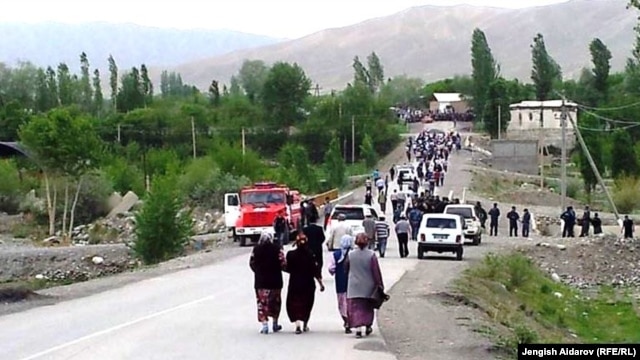Central Asian neighbors seek calm after border violence
| Publisher | Radio Free Europe/Radio Liberty |
| Publication Date | 5 August 2015 |
| Cite as | Radio Free Europe/Radio Liberty, Central Asian neighbors seek calm after border violence, 5 August 2015, available at: https://www.refworld.org/docid/55ee966c15.html [accessed 31 May 2023] |
| Disclaimer | This is not a UNHCR publication. UNHCR is not responsible for, nor does it necessarily endorse, its content. Any views expressed are solely those of the author or publisher and do not necessarily reflect those of UNHCR, the United Nations or its Member States. |
August 05, 2015
By RFE/RL
 There have been a number of cross-border incidents in recent years between Kyrgyzstan's Batken and Tajikistan's Isfara districts. (file photo)
There have been a number of cross-border incidents in recent years between Kyrgyzstan's Batken and Tajikistan's Isfara districts. (file photo)
CHORKUH, Tajikistan – Kyrgyzstan and Tajikistan have deployed troops and dispatched officials to a volatile frontier region where two days of violence highlighted combustive tensions in the borderlands of ex-Soviet Central Asia.
The August 3-4 clashes between residents of border villages left several people injured, including some severely wounded by gunfire, and raised fears that violence could spiral out of control.
Jittery governments in the national capitals, far from the remote border area, sent officials who started a two-day meeting on August 5 in a bid to ensure that there is no escalation.
Officials called for a clearer demarcation of borders between countries that were both part of the Soviet Union less than a quarter-century ago.
But there were no easy recipes to eradicate tension in an area where simmering disputes over access to water, roads, and land have frequently erupted into violence in recent years.
The latest conflict broke out on August 3 between residents of Kok-Tash, a village on the Kyrgyz side of the border, and the village of Chorkuh on the Tajik side.
Authorities said Tajiks blocked a road, preventing Kyrgyz from reaching a local cemetery that the Tajiks say belongs to their community. Kyrgyz then blocked the flow of water to the Tajik village.
Verbal arguments quickly spiraled into violence, with dozens from both sides throwing stones at each other.
Several people from both sides were injured and windows of houses and cars were smashed by rocks.
Stone-throwing continued on August 4 and tension increased when gunfire was heard in the area, with each side blaming the other for the shots.
An RFE/RL Tajik Service correspondent at the scene, Farzon Muhammadi, says four Tajiks were taken to the village hospital in Chorkuh with gunshot wounds.
"One of the injured has been discharged but three others with more severe injuries were transferred to the regional hospital for treatment," Muhammadi said.
Kyrgyz officials say no one from the Kyrgyz side sustained gunshot wounds, but that six or seven people were hospitalized with injuries following the stone-throwing.
Dozens of border guard troops and police were deployed in both villages.
"The situation appears to be calm now but armed troops are seen on the streets," Muhammadi reported on August 5. He said that officials from the central and local governments were meeting in the center of Chorkuh.
Long-Standing Tensions
Bishkek and Dushanbe have held a series of high-level meetings to address the long-standing cross-border tension between Kyrgyzstan's Batken and Tajikistan's Isfara districts.
Skirmishes usually involve residents but sometimes they lead to exchanges of fire between border troops.
Several members of security forces from both sides were injured in cross-border shooting in July 2014, part of an outbreak of violence sparked by a controversial water pipeline project. A Tajik national was reportedly killed in that conflict, which the two sides blamed on each other.
Raimberdi Duyshenbiev, the head of Kyrgyzstan's state border service, told RFE/RL's Kyrgyz Service that "the border needs to be clearly defined" to prevent future tensions.
"The border should be determined, especially, in the disputed areas, where incidents frequently occur," Duyshenbiev said.
"The issue of water, land parcels, and grazing lands still remain unresolved. Conflicts usually arise over these issues," he said.
"We need to reassure local residents that these issues will be resolved with efforts from both sides," he added.
Written by Farangis Najibullah with reporting by RFE/RL's Tajik Service correspondent Farzon Muhammadi in Chorkuh and Kyrgyz Service correspondent Burulkan Sarygulova in Bishkek
Link to original story on RFE/RL website
